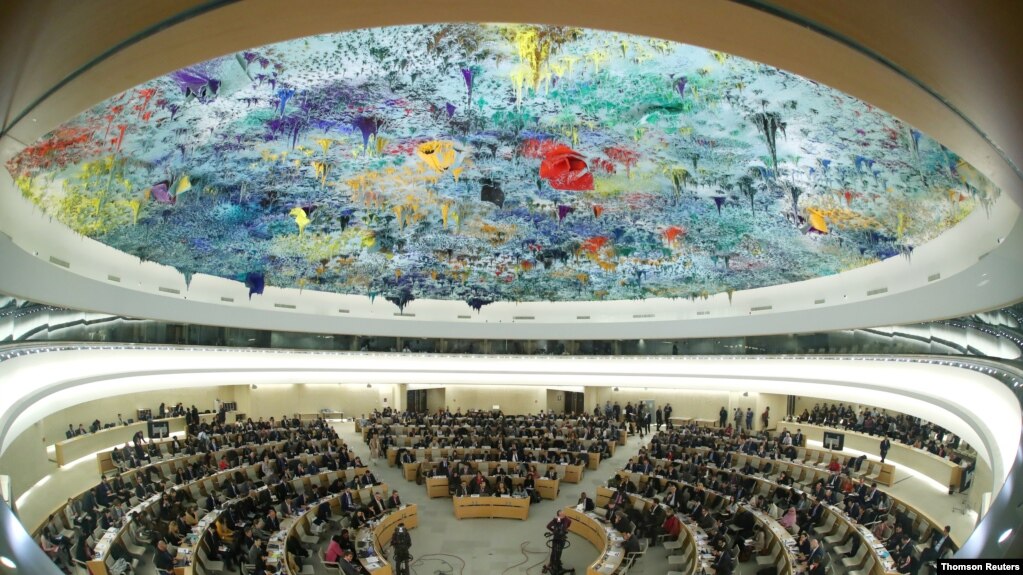US to Return to Controversial UN Human Rights Council

NEW YORK —
The United States is set to return to the United Nations Human Rights Council in January, reversing the former Trump administration's withdrawal from the controversial body in 2018.
"The United States stands ready to work with partners and allies to help lead the world toward a more peaceful, prosperous future, grounded in respect for human dignity," U.S. President Joe Biden said in a statement after the vote. "Together, we will stand up for the rights of all, including women and girls, members of LGBTQI+ communities, members of ethnic and religious minorities, those living with disabilities, and members of other marginalized groups."
Washington secured 168 votes, far more than the simple majority of 97 needed. Even so, only Eritrea, with 144 votes, polled lower among the 18 countries elected to the council.
U.S. envoy Linda Thomas-Greenfield said returning to the council fulfills Biden's campaign pledge to rejoin the body to ensure it lives up to its mandate.
"We will use every tool at our disposal, from introducing resolutions and amendments to wielding our vote when needed," she said in a statement. "Our goals are clear: stand with human rights defenders and speak out against violations and abuses of human rights."
One of the main criticisms of the Human Rights Council is that some of those rights abusers are members of the body, a criticism Secretary of State Antony Blinken acknowledged.
"The council provides a forum where we can have open discussions about ways we and our partners can improve," he said. "At the same time, it also suffers from serious flaws, including disproportionate attention on Israel and the membership of several states with egregious human rights records."
Blinken said states must push back against attempts "to subvert the ideals upon which the Human Rights Council was founded."
Domestically, the administration's decision to rejoin the council drew political pushback.
"The United States should not be lending its legitimacy to a body that includes perpetrators of human rights abuses like China, Venezuela and Cuba," said U.S. Senator Jim Risch, the senior Republican on the Senate Foreign Relations Committee. "Additionally, the council continues to disproportionately spend the majority of its time and attention persecuting our ally, Israel."
The council's focus on Israel's treatment of the Palestinians was one of the main reasons the Trump administration withdrew in 2018.
Uncontested vote
Eighteen countries ran for 18 available seats on the 47-member Geneva, Switzerland-based council, making the outcome a foregone conclusion and garnering some criticism.
"Today's Human Rights Council vote, devoid of competition, makes a mockery of the word 'election,'" said Louis Charbonneau, U.N. director at Human Rights Watch. "Allowing serial rights abusers like UAE (United Arab Emirates), Cameroon and Eritrea to waltz onto the council to join other serious abusers like China and Russia sends the wrong signal about the U.N.'s top rights body."
The newly elected members are: Benin, Gambia, Cameroon, Somalia and Eritrea from Africa; India, Kazakhstan, Malaysia, Qatar, and the United Arab Emirates from the Asia-Pacific region; Lithuania and Montenegro from Eastern Europe; Paraguay, Argentina and Honduras from Latin America and the Caribbean; Finland, Luxembourg and the United States from the group known as Western Europe and Others.
They will take up their seats January 1, starting their three-year terms.
Imperfect body
Countries that join the council are expected to “uphold the highest standards in the promotion and protection of human rights” both at home and abroad.
Washington’s human rights record also came in for some domestic criticism.
“The United States' uncontested election to the Human Rights Council doesn't change the fact that we lag far behind on our international human rights obligations,” said Jamil Dakwar, director of the American Civil Liberties Union human rights program. “From ending mass incarceration to dismantling systemic racism to protecting immigrants’ rights, the Biden administration must take bold action to advance human rights and racial justice at home and abroad.”
“By rejoining the Human Rights Council, the U.S. will have an opportunity to demonstrate just how serious the Biden administration is about making human rights central to its domestic and foreign policies,” HRW’s Charbonneau said. “With a lot of missteps so far, they should use their time on the council to promote human rights among friends and foes alike.”
The council has a mixed reputation. Diplomats say it has produced some important and strong reports on war crimes in places like Syria, and spotlights domestic abuses in North Korea, Iran and Myanmar, among others. But it also is frequently criticized for its focus on Israel and the inclusion among its members of several countries with poor rights records of their own, like China, Russia and Pakistan.
The Human Rights Council was created in 2006 to replace the dysfunctional U.N. Human Rights Commission, which was disbanded. The administration of former U.S. President George W. Bush opted against seeking membership, and the United States did not join until 2009 when the administration of then-President Barack Obama said it sought to improve the council by working from within it. Washington withdrew again in 2018 under the Trump administration.


